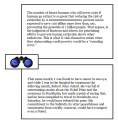Considering “the proper study of mankind”
[ by Charles Cameron — I am reminded also of Abraham Joshua Heschel’s great and simple book, The Sabbath ]
.
Two very different styles of thinking came to my attention today. The first style (upper panel, below) is that now commonly found within the effective altruism movement:
The second (lower panel, above) comes from Oliver Sacks, physician.
Between them lies the difference between quantitative and qualitative modes of thinking — which is to say between quantity and quality as the two great vectors aloing which we align our lives and futures.
**
Sources:
**
Rabbi Heschel‘s book, The Sabbath, opens with the words:
He who wants to enter the holiness of the day must first lay down the profanity of clattering commerce, of being yoked to toil.

Charles Cameron:
August 17th, 2015 at 5:51 pm
Friend Bill Benzon has a piece upo today that’s close kin to this one. He’s titled it Amazon and the Borg vs. Shabbos and the People and it compares Amazon’s employment practices as detailed by Jodi Kantor and David Streitfeld in Inside Amazon: Wrestling Big Ideas in a Bruising Workplace with the same Oliver Sacks piece I contrasted above with Dylan Matthews’ piece on Google.
.
You can judge how close Bill’s piece is to mine in spirit from his comment:
Amazon work ethic and Google altruism appear to be cut from the same cloth, both contrasting strongly with the culture of Sabbath that Oliver Sacks so movingly describes.
.
Key to Bill’s account is this observation:
And the secret within that possibility? Sacks gives us a glimpse:
Bill Benzon:
August 17th, 2015 at 6:09 pm
Great minds, Charles, Great minds….